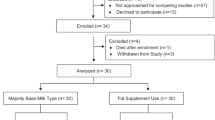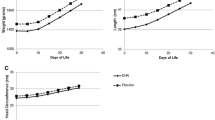Summary.
Long-chain polyunsaturated fatty acids (LCP) are considered conditionally essential nutrients for the infant born prematurely, and attempts are being made to match fatty acid profiles of formula and breast fed infants. In this double-blind, randomized study we investigated the effects of a formula enriched with both n-6 and n-3 LCP on plasma fatty acid profiles, antioxidant status and growth of premature infants. 29 infants received either a formula devoid of LCP or a LCP supplemented formula (0.5 g/100 g fat linoleic acid metabolites, 0.8 g/100 g fat α-linolenic acid metabolites). 17 breast fed infants served as a control group. At study entry as well as two and four weeks later, plasma and urine samples were collected, growth data obtained and food tolerance was documented. At the end of the four week study period, plasma docosahexaenoic acid (DHA) levels of supplemented infants were significantly higher than those of unsupplemented infants and similar to those of infants fed human milk. Plasma n-6 LCP concentrations including arachidonic acid (AA) were similar between groups. The plasma α-tocopherol levels of breast fed and supplemented infants were similar and tended to be lower than in infants fed the formula devoid of LCP. Urinary malondialdehyde (MDA) excretion of formula fed infants was significantly higher compared to infants fed human milk, but did not differ between the two formula groups. Parameters of growth and milk tolerance did not differ between groups. Our results demonstrate that plasma LCP levels similar to those of breast fed infants can be achieved with the LCP supplemented formula used in this trial, without evidence of adverse effects of the LCP enrichment.
Similar content being viewed by others
Abbreviations
- AA:
-
arachidonic acid
- ALA:
-
α-linolenic acid
- DGLA:
-
dihomo-γ-linolenic acid
- DHA:
-
docosahexaenoic acid
- EPA:
-
eicosapentaenoic acid
- F:
-
formula devoid of LCP
- GLA:
-
γ-linolenic acid
- HM:
-
human milk
- LA:
-
linoleic acid
- LCP:
-
long-chain polyunsaturated fatty acids
- LCP-F:
-
formula enriched with LCP
- MDA:
-
malondialdehyde
- PC:
-
phosphatidylcholine
- PCA:
-
postconceptional age
- PE:
-
phosphatidylethanolamine
- PUFA:
-
polyunsaturated fatty acid
Author information
Authors and Affiliations
Corresponding author
Rights and permissions
About this article
Cite this article
Koletzko, B., Sauerwald, U., Keicher, U. et al. Fatty acid profiles, antioxidant status, and growth of preterm infants fed diets without or with long-chain polyunsaturated fatty acids. Eur J Nutr 42, 243–253 (2003). https://doi.org/10.1007/s00394-003-0418-2
Received:
Accepted:
Issue Date:
DOI: https://doi.org/10.1007/s00394-003-0418-2




